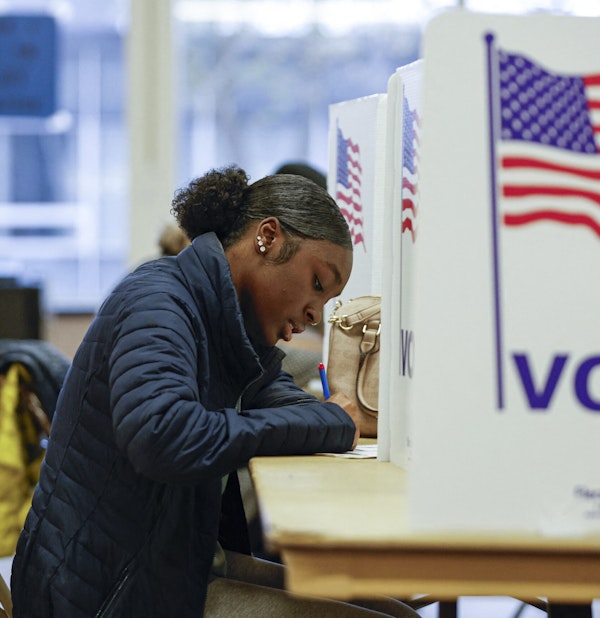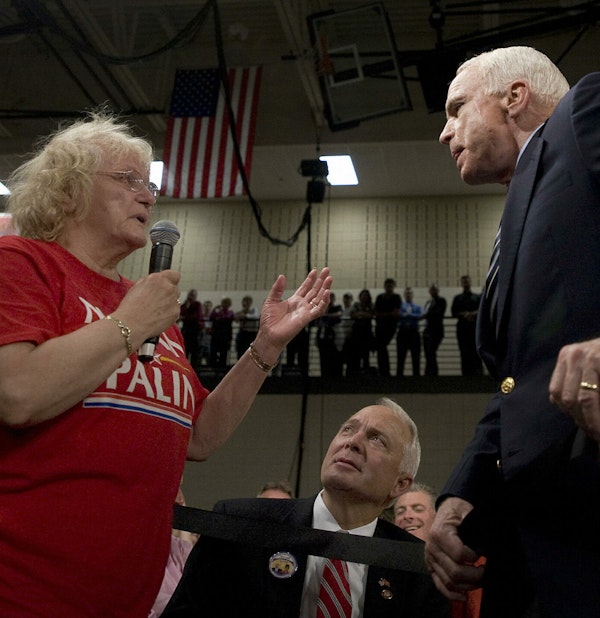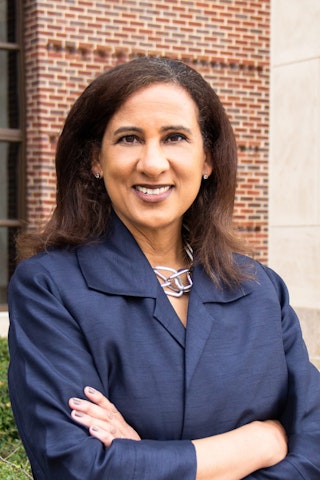The right way to think about diversity
Competition and balance among different groups are what make America strong
 Immigrant children at Ellis Island, New York in 1908. (Everett Collection / Shutterstock)
Immigrant children at Ellis Island, New York in 1908. (Everett Collection / Shutterstock)
As the United States faces democratic decline – weakened checks on executive authority, political violence, attacks on the freedom of speech, rising polarization, and increased distrust in institutions – as well as rising political tensions, Americans are searching for a panacea. Given the country’s highly diverse and politically fractious population, many Americans are also questioning whether we can – or even should – live in a country so deeply divided.
To rebuild the strength of U.S. democracy – and with it, the country’s credibility on the world stage – Americans must (re)commit to a concept that draws strength, not weakness, from our differences: pluralism. Strong principled leadership committed to pluralism will be essential to leveraging this important concept to repair our democracy. Building a pluralistic democratic culture not only can be done – it must be done for the nearly 250-year-old American democratic experiment to not just survive but thrive.
 A woman casts her vote during the U.S. general election in Grand Rapids, Michigan on Nov. 3, 2024. (Kamil Krzaczynski/AFP via Getty Images)
A woman casts her vote during the U.S. general election in Grand Rapids, Michigan on Nov. 3, 2024. (Kamil Krzaczynski/AFP via Getty Images)
Strength in numbers
Given the country’s many problems today, touting pluralism as a solution may seem academic, out of touch, or naive. It is, however, the best way to ensure the United States remains peaceful and democratic. Rather than viewing diversity as a problem that needs to be eradicated or contained, pluralism accepts it as a reality that can be navigated – even harnessed for our benefit.
Before proceeding, it would be helpful to define the term. “Pluralism” refers to a basic philosophy or mindset that embraces the multiplicity of diverse groups, ideologies, and interests within a country and encourages those groups to live peaceably alongside one another. To advance such goals, democratic systems should foster competition for representation and influence among different groups and encourage a balance of power – rather than the concentration of power in one single institution or entity that favors one point of view.
If this sounds promising but difficult, that’s because it is. So is maintaining a democracy. But as Americans have learned throughout our history, it’s worth the trouble.
Indeed, pluralism is not a new concept. Ever since the founding of the country, American leaders have wrestled with how to manage a wide array of faiths, ideologies, regional interests, and viewpoints. The Founders knew that political and religious diversity would be an inevitable feature of our new country and therefore created frameworks to navigate what they expected could be a difficult process of accommodating such diversity. While the Founders could not predict the precise path the country would follow in the future, they knew that successfully managing the interplay between human nature and democratic institutions would be crucial to America’s success.
In Federalist No. 10, James Madison both warned of the fractiousness inherent to a new democracy and argued that democratic institutions can guard against these dangers. Madison knew that human nature inevitably creates factions, which can divide a society or prompt a heavy-handed leader to impose one faction’s interests on the entire country. He explored the feasibility of eliminating factions – by abolishing them or forcing everyone to believe the exact same thing – but rightfully deemed both options to be impossible. The better path, he argued, would be for society to deal with the effects of factions by building strong democratic institutions and electing responsible representatives – both of which should allow factional voices to be heard but prevent any one group from becoming so powerful that it can repress the others. Rather than resisting or eliminating diversity, in other words, government should play the role of umpire. By balancing majority rule with minority rights, democracies should allow factions to compete fairly and respect the rights of all people.
Extolling representative government as a means to navigate a fractious society, Madison wrote that the United States has “a republican remedy for the diseases most incident to republican government.”
That remedy is as important today as it was almost 250 years ago.
 Senator John McCain takes a question from a supporter during a town hall meeting in Lakeville, Minnesota on Oct. 10 2008. (Jim Watson/AFP via Getty Images)
Senator John McCain takes a question from a supporter during a town hall meeting in Lakeville, Minnesota on Oct. 10 2008. (Jim Watson/AFP via Getty Images)
Embracing difference
Too often today, U.S. politicians, advocacy groups, universities, and our media treat viewpoint diversity as something that can and should be stamped out by government or societal leaders or through social pressure. We seem to defend viewpoint diversity only when we personally feel like we’ve been silenced. One can see such anti-pluralistic behavior on both the left and right – from canceling conservative or religious voices on campus, in the media, or in government projects, to targeting and silencing progressive “woke” voices. It has become commonplace for Americans of all stripes to demonize those with different views simply because they have different views. And now government officials have rapidly accelerated this undemocratic behavior by seeking to silence critics, discourage dissent, and curtail speech and protest.
Yet as authoritarian regimes around the world have learned to their dismay, differing viewpoints can never truly be stamped out. Attempting to do so leads to destabilization and unrest, not stability or unity. It only invigorates the views that they are trying to stamp out.
Pluralism offers a better alternative, by giving society frameworks for peaceably navigating difference. To strengthen pluralism today, Americans must act on three levels – cultural, institutional, and individual (through leadership).
Let’s start with culture. As a nation of immigrants and Native Americans, the United States does not share a single ideological, ethnic, racial, or linguistic culture. What it has instead is an evolving democratic culture, anchored in our founding documents and forged through two and half centuries of seeking to make those founding principles a reality. In this system, the best means for advancing our respective subcultures – ideological, religious, ethnic, or racial – is to invest in our shared democratic culture, which creates and protects the space needed for our diverse subcultures to coexist and thrive.
Culture seems difficult to shape. But it is actually highly fluid, particularly in an era of rapid information transfer. Leaders, influencers, activists, and individual citizens must commit to advocating for democratic culture. This entails regularly and publicly acknowledging the existence and legitimacy of opposing views – even views that might seem disagreeable. And we must commit to never compromising our democratic processes or institutions for partisan gain.
In this highly polarized era, it might be hard to imagine that American citizens or leaders will reaffirm democratic values and the rights of others alongside or even over their narrow partisan goals. But the United States has reached a point at which failing to protect our democratic culture will endanger the very system that allows for partisan activism. We therefore ignore pluralism at our own peril.
During the 2008 presidential campaign, U.S. Sen. John McCain showed how this process – elevating pluralism while advancing partisan views – can work. During a town hall discussion, when an attendee questioned then-Senator (and presidential candidate) Barack Obama’s views, trustworthiness, and nationality, McCain forcefully pushed back, saying, “He’s a decent family man [and] citizen that I just happen to have disagreements with on fundamental issues, and that’s what the campaign’s all about.” McCain’s message was stark: Disagree on substance. Acknowledge others’ rights to think differently. Recognize your opponent’s humanity. And then use democratic institutions to advance your cause. Each of us has plenty of opportunities – as well as the responsibility – to create such McCain moments.
Our next priority should be to protect the health of our institutions. The United States is very lucky to boast a well-developed set of institutions designed specifically to peacefully navigate political difference. The stronger these institutions are, the better our pluralistic democracy will work and the stronger our society and our country will be. The more we attack, undermine, or weaken them, the more we will turn to alternatives – mob rule, violent protests, or governmental persecution – to resolve our differences.
It is therefore crucial that all Americans – whatever our differences over policy – unite in opposing anyone who seeks to undermine our institutions, even if that person is a political ally. Protecting democratic institutions must be kept fully separate from partisan politics and must be done even when the outcomes don’t align with one’s desires. Leaders on all sides must work together to defend our democratic institutions. This will be a challenging task in our polarized environment, especially given the risk that principled officials will face primary challenges or physical harm. But the short-term sacrifice of our democratic institutions for political gain will result in the long-term sacrifice of our democracy, and none of us can afford that.
The final key to protecting pluralism is leadership. There is simply no replacement for strong, democratic, ethical leadership. To sustain our democracy, therefore, American voters need leaders who share an unwavering commitment to pluralistic democracy. Candidates should be judged both on their commitment to pluralistic democracy and their ability to advance their policy platform. Demonizing opponents or certain segments of our society weakens our society as a whole. Undermining democratic institutions undercuts our democracy. Trying to silence those who think differently erodes the foundation of our pluralistic system. Our elected officials take an oath of office to uphold the Constitution, not to advance their platform or party views. That means protecting the freedoms of all people – including those they don’t like.
America today faces serious tensions and problems. As we navigate them, let pluralism be our framework. We must not silence or simply tolerate difference. We must use pluralism to ensure that we are like iron sharpening iron and thereby forge a stronger democracy.
The Catalyst believes that ideas matter. We aim to stimulate debate on the most important issues of the day, featuring a range of arguments that are constructive, high-minded, and share our core values of freedom, opportunity, accountability, and compassion. To that end, we seek out ideas that may challenge us, and the authors’ views presented here are their own; The Catalyst does not endorse any particular policy, politician, or party.

